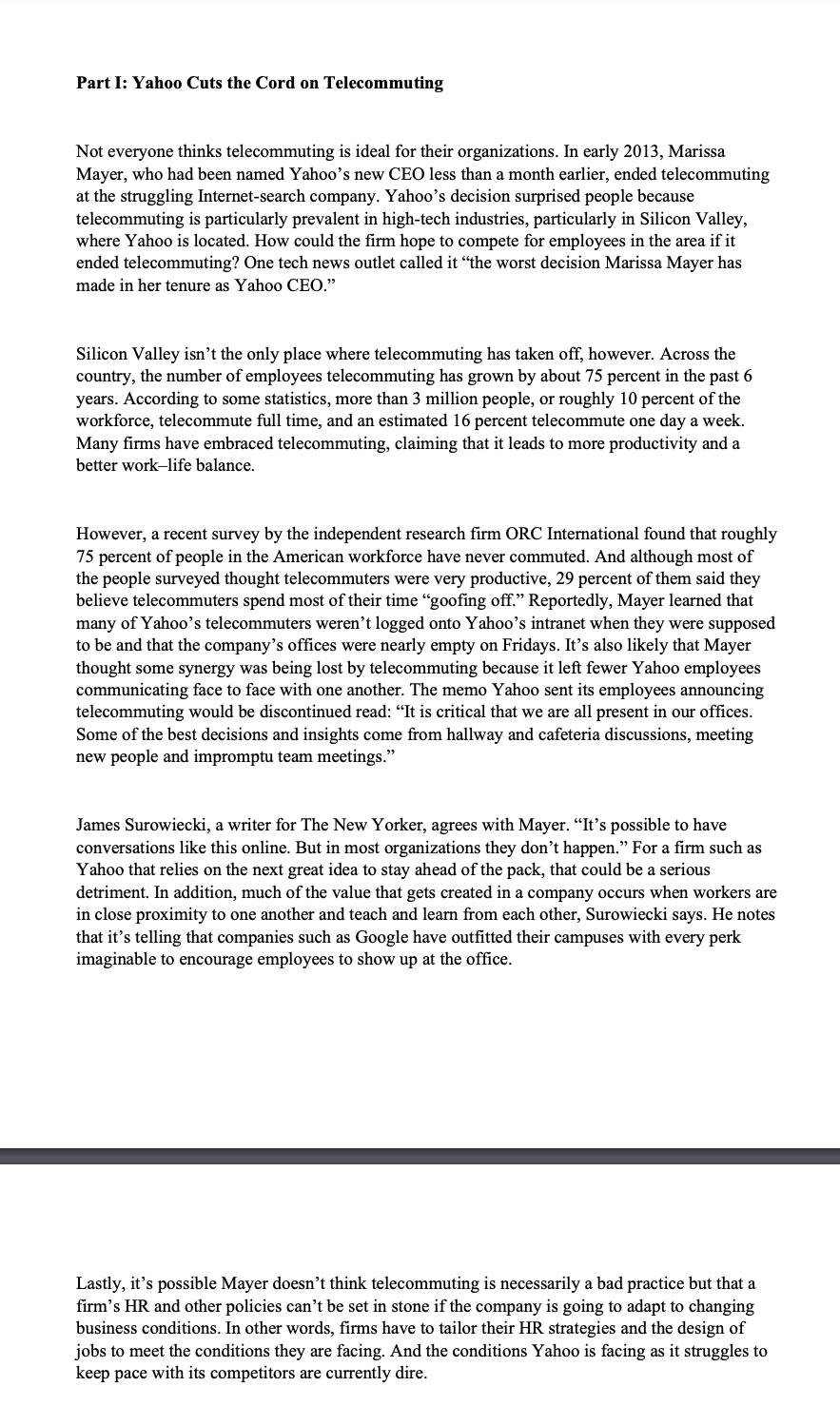3)What is the strategic significance of incorporating telecommuting within organizations? Please refrain from using the information shared in this case as an answer. The response should be based on your analysis and critical evaluation. It is expected that you support your answer with the course content. The case should only be used as background information.
3)What is the strategic significance of incorporating telecommuting within organizations? Please refrain from using the information shared in this case as an answer. The response should be based on your analysis and critical evaluation. It is expected that you support your answer with the course content. The case should only be used as background information.
Chapter1: Taking Risks And Making Profits Within The Dynamic Business Environment
Section: Chapter Questions
Problem 1CE
Related questions
Question
3)What is the strategic significance of incorporating telecommuting within organizations?
Please refrain from using the information shared in this case as an answer. The response should be based on your analysis and critical evaluation. It is expected that you support your answer with the course content. The case should only be used as background information.

Transcribed Image Text:Part I: Yahoo Cuts the Cord on Telecommuting
Not everyone thinks telecommuting is ideal for their organizations. In early 2013, Marissa
Mayer, who had been named Yahoo's new CEO less than a month earlier, ended telecommuting
at the struggling Internet-search company. Yaho0's decision surprised people because
telecommuting is particularly prevalent in high-tech industries, particularly in Silicon Valley,
where Yahoo is located. How could the firm hope to compete for employees in the area if it
ended telecommuting? One tech news outlet called it "the worst decision Marissa Mayer has
made in her tenure as Yahoo CEO."
Silicon Valley isn’t the only place where telecommuting has taken off, however. Across the
country, the number of employees telecommuting has grown by about 75 percent in the past 6
years. According to some statistics, more than 3 million people, or roughly 10 percent of the
workforce, telecommute full time, and an estimated 16 percent telecommute one day a week.
Many firms have embraced telecommuting, claiming that it leads to more productivity and a
better work-life balance.
However, a recent survey by the independent research firm ORC International found that roughly
75 percent of people in the American workforce have never commuted. And although most of
the people surveyed thought telecommuters were very productive, 29 percent of them said they
believe telecommuters spend most of their time "goofing off." Reportedly, Mayer learned that
many of Yahoo's telecommuters weren't logged onto Yahoo's intranet when they were supposed
to be and that the company's offices were nearly empty on Fridays. It's also likely that Mayer
thought some synergy was being lost by telecommuting because it left fewer Yahoo employees
communicating face to face with one another. The memo Yahoo sent its employees announcing
telecommuting would be discontinued read: "It is critical that we are all present in our offices.
Some of the best decisions and insights come from hallway and cafeteria discussions, meeting
new people and impromptu team meetings."
James Surowiecki, a writer for The New Yorker, agrees with Mayer. "It's possible to have
conversations like this online. But in most organizations they don't happen." For a firm such as
Yahoo that relies on the next great idea to stay ahead of the pack, that could be a serious
detriment. In addition, much of the value that gets created in a company occurs when workers are
in close proximity to one another and teach and learn from each other, Surowiecki says. He notes
that it's telling that companies such as Google have outfitted their campuses with every perk
imaginable to encourage employees to show up at the office.
Lastly, it's possible Mayer doesn’t think telecommuting is necessarily a bad practice but that a
firm's HR and other policies can't be set in stone if the company is going to adapt to changing
business conditions. In other words, firms have to tailor their HR strategies and the design of
jobs to meet the conditions they are facing. And the conditions Yahoo is facing as it struggles to
keep pace with its competitors are currently dire.
Expert Solution
This question has been solved!
Explore an expertly crafted, step-by-step solution for a thorough understanding of key concepts.
Step by step
Solved in 2 steps

Recommended textbooks for you

Understanding Business
Management
ISBN:
9781259929434
Author:
William Nickels
Publisher:
McGraw-Hill Education

Management (14th Edition)
Management
ISBN:
9780134527604
Author:
Stephen P. Robbins, Mary A. Coulter
Publisher:
PEARSON

Spreadsheet Modeling & Decision Analysis: A Pract…
Management
ISBN:
9781305947412
Author:
Cliff Ragsdale
Publisher:
Cengage Learning

Understanding Business
Management
ISBN:
9781259929434
Author:
William Nickels
Publisher:
McGraw-Hill Education

Management (14th Edition)
Management
ISBN:
9780134527604
Author:
Stephen P. Robbins, Mary A. Coulter
Publisher:
PEARSON

Spreadsheet Modeling & Decision Analysis: A Pract…
Management
ISBN:
9781305947412
Author:
Cliff Ragsdale
Publisher:
Cengage Learning

Management Information Systems: Managing The Digi…
Management
ISBN:
9780135191798
Author:
Kenneth C. Laudon, Jane P. Laudon
Publisher:
PEARSON

Business Essentials (12th Edition) (What's New in…
Management
ISBN:
9780134728391
Author:
Ronald J. Ebert, Ricky W. Griffin
Publisher:
PEARSON

Fundamentals of Management (10th Edition)
Management
ISBN:
9780134237473
Author:
Stephen P. Robbins, Mary A. Coulter, David A. De Cenzo
Publisher:
PEARSON